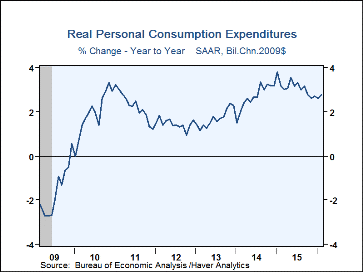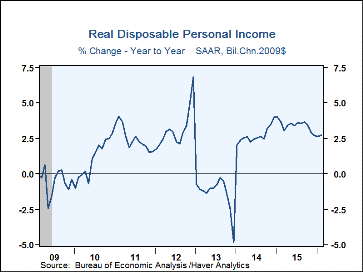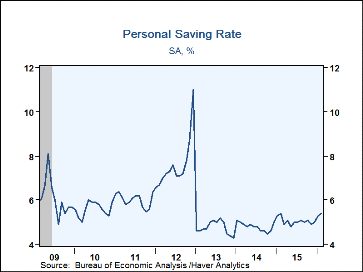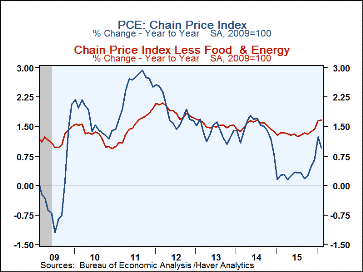 Global| Mar 28 2016
Global| Mar 28 2016U.S. Personal Spending Is Restrained As Saving Increases
by:Tom Moeller
|in:Economy in Brief
Summary
Personal consumption expenditures during February increased a minimal 0.1% (3.8% y/y) for the third consecutive month. January's gain was revised from 0.5%. The latest rise matched expectations in the Action Economics Forecast Survey. [...]
Personal consumption expenditures during February increased a minimal 0.1% (3.8% y/y) for the third consecutive month. January's gain was revised from 0.5%. The latest rise matched expectations in the Action Economics Forecast Survey. Spending on durable goods edged 0.1% higher (3.7% y/y) following a 0.7% decline, revised from 1.2%. Motor vehicle purchases gained 0.2% (1.3% y/y) after a 0.4% decline, revised from +2.2%. Purchases of furniture & durable household equipment fell 0.3% (+4.4% y/y) following a downwardly revised 0.2% gain. Purchases of recreational products & vehicles declined slightly (+6.1% y/y) after a 1.6% fall, which was revised from a +0.9% jump. Nondurable goods spending fell 1.1% (+0.9% y/y), the fifth decline in the last six months. Gasoline purchases were off 11.2% (-7.8% y/y due to lower prices. Constant dollar spending on gasoline rose 0.5% and was unchanged y/y. Clothing & footwear purchases rose 0.3% (7.4% y/y). Services spending strengthened 0.4% (4.7% y/y) as food services & accommodations spending recovered 0.9% (6.5% y/y) after a 0.8% decline. Recreation services spending also was firm and increased 0.4% (7.9% y/y).
Adjusted for price inflation, personal consumption rose 0.2% (2.8% y/y) after little change in January, revised from 0.4%.
Personal income improved 0.2% (4.0% y/y) after an unrevised 0.5% increase. A 0.1% increase had been expected. Wages & salaries eased 0.1% (+4.3% y/y), following a 0.6% jump. Rental income strengthened 1.0% (8.0% y/y) while proprietors income remained unchanged (3.6% y/y). Transfer payments increased 0.5% (4.3% y/y) as Medicaid receipts rose 0.7% (5.9% y/y). Social security payments increased a steady 0.4% (5.0% y/y). Unemployment insurance payments remained unchanged (-6.5% y/y).
Disposable personal income increased 0.2% (3.7% y/y), softer than January's 0.4% gain. Adjusted for price increases, take-home pay rose a steady 0.3% (2.7% y/y).
The personal savings rate improved to 5.4%, the highest level in twelve months.
The chain-type price index eased +0.1%, but the y/y increase of 1.0% compared to a 0.3% rise during all of last year. It was the firmest twelve month rise since late-2014. The price index excluding food & energy also nudged 0.1% higher (1.7% y/y), the strongest y/y rise since January 201July 2014. The service price index edged up 0.1% (2.1% y/y) and has been strengthening for a year. The durable goods index declined 0.3% (-1.5%), but y/y rate of decline compares with -2.3% a year ago. The nondurables price index fell 0.8% (-1.4% y/y) with lower gasoline prices.
The personal income & consumption figures are available in Haver's USECON database with detail in the USNA database. The Action Economics figure is in the AS1REPNA database.
| Personal Income & Outlays (%) | Feb | Jan | Dec | Feb Y/Y | 2015 | 2014 | 2013 |
|---|---|---|---|---|---|---|---|
| Personal Income | 0.2 | 0.5 | 0.3 | 4.0 | 4.4 | 4.4 | 1.1 |
| Wages & Salaries | -0.1 | 0.6 | 0.2 | 4.3 | 4.6 | 5.1 | 2.7 |
| Disposable Personal Income | 0.2 | 0.4 | 0.3 | 3.7 | 3.7 | 4.2 | -0.1 |
| Personal Consumption Expenditures | 0.1 | 0.1 | 0.1 | 3.8 | 3.4 | 4.2 | 3.1 |
| Personal Saving Rate | 5.4 | 5.3 | 5.0 | 5.4 (Feb. '15) |
5.0 | 4.8 | 4.8 |
| PCE Chain Price Index | -0.1 | 0.1 | -0.1 | 1.0 | 0.3 | 1.4 | 1.4 |
| Less Food & Energy | 0.1 | 0.3 | 0.1 | 1.7 | 1.3 | 1.5 | 1.5 |
| Real Disposable Income | 0.3 | 0.3 | 0.3 | 2.7 | 3.4 | 2.7 | -1.4 |
| Real Personal Consumption Expenditures | 0.2 | -0.0 | 0.2 | 2.8 | 3.1 | 2.7 | 1.7 |
Tom Moeller
AuthorMore in Author Profile »Prior to joining Haver Analytics in 2000, Mr. Moeller worked as the Economist at Chancellor Capital Management from 1985 to 1999. There, he developed comprehensive economic forecasts and interpreted economic data for equity and fixed income portfolio managers. Also at Chancellor, Mr. Moeller worked as an equity analyst and was responsible for researching and rating companies in the economically sensitive automobile and housing industries for investment in Chancellor’s equity portfolio. Prior to joining Chancellor, Mr. Moeller was an Economist at Citibank from 1979 to 1984. He also analyzed pricing behavior in the metals industry for the Council on Wage and Price Stability in Washington, D.C. In 1999, Mr. Moeller received the award for most accurate forecast from the Forecasters' Club of New York. From 1990 to 1992 he was President of the New York Association for Business Economists. Mr. Moeller earned an M.B.A. in Finance from Fordham University, where he graduated in 1987. He holds a Bachelor of Arts in Economics from George Washington University.
More Economy in Brief
 Global| Feb 05 2026
Global| Feb 05 2026Charts of the Week: Balanced Policy, Resilient Data and AI Narratives
by:Andrew Cates










